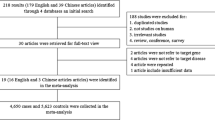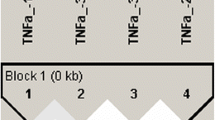Abstract
Toll-like receptor (TLR)-mediated signaling pathways induce a proinflammatory microenvironment to eradicate pathogens. However, in rheumatoid arthritis (RA) and systemic lupus erythematosus (SLE), TLRs can promote chronic inflammation. It has been shown that some TLR4 and TLR9 single nucleotide polymorphisms (SNPs) are risk factors for RA and SLE, but these findings have not been replicated in all populations; thus, results are inconclusive. We evaluated the TLR4 Asp299Gly, Thr399Ile, − 1892G/A SNPs, and the TLR9 Pro545Pro SNP to assess potential associations with RA and SLE in Mexican patients. This study included 474 patients with RA, 283 patients with SLE, and 424 healthy controls. We used a 5′ nuclease allelic discrimination assay to genotype individuals for the four TLR4 and TLR9 polymorphisms. We found that the genotype or allelic frequencies of the TLR4 Asp299Gly, Thr399Ile, − 1892G/A, and TLR9 Pro545Pro polymorphisms were similar between patients and controls. We found no association under different genetic models. A haplotype analysis of TLR4 showed no association with either RA or SLE. We found no significant differences in the allelic or genotypic frequencies of TLR4 Asp299Gly, Thr399IIe, − 1892G/A, or TLR9 Pro545Pro between patients and controls. These findings suggested that these variants are not risk factors for RA or SLE in Mexican patients.
Similar content being viewed by others
References
Joosten LAB, Abdollahi-Roodsaz S, Dinarello CA et al (2016) Toll-like receptors and chronic inflammation in rheumatic diseases: New developments. Nat Rev Rheumatol 12:344–357
Jiménez-Dalmaroni MJ, Gerswhin ME, Adamopoulos IE (2016) The critical role of toll-like receptors - from microbial recognition to autoimmunity: a comprehensive review. Autoimmun Rev 15:1–8
Elshabrawy HA, Essani AE, Szekanecz Z, Shahrara S (2017) TLRs, future potential therapeutic targets for RA. Autoimmun Rev 16:103–113
Radstake TRDJ, Franke B, Hanssen S et al (2004) The Toll-like receptor 4 Asp299Gly functional variant is associated with decreased rheumatoid arthritis disease susceptibility but does not influence disease severity and/or outcome. Arthritis Rheum 50:999–1001
Rupasree Y, Naushad SM, Rajasekhar L et al (2015) Association of TLR4 (D299G, T399I), TLR9 -1486T>C, TIRAP S180L and TNF-α promoter (-1031, -863, -857) polymorphisms with risk for systemic lupus erythematosus among South Indians. Lupus 24:50–57
Wang Y, Chen L, Li F et al (2017) TLR4 rs41426344 increases susceptibility of rheumatoid arthritis (RA) and juvenile idiopathic arthritis (JIA) in a central south Chinese Han population. Pediatr Rheumatol Online J 15:12
Gębura K, Świerkot J, Wysoczańska B et al (2017) Polymorphisms within genes involved in regulation of the NF-κB pathway in patients with rheumatoid arthritis. Int J Mol Sci 18:1432
Sánchez E, Orozco G, López-Nevot MÁ et al (2004) Polymorphisms of toll-like receptor 2 and 4 genes in rheumatoid arthritis and systemic lupus erythematosus. Tissue Antigens 63:54–57
Sheedy FJ, Marinou I, O’Neill LAJ et al (2008) The Mal/TIRAP S180L and TLR4 G299D polymorphisms are not associated with susceptibility to, or severity of, rheumatoid arthritis. Ann Rheum Dis 67:1328–1331
Zheng B, Li Q, Wei C et al (2010) Lack of association of TLR4 gene Asp299Gly and Thr399Ile polymorphisms with rheumatoid arthritis in Chinese Han population of Yunnan Province. Rheumatol Int 30:1249–1252
Emonts M, Hazes MJMW, Houwing-Duistermaat JJ et al (2011) Polymorphisms in genes controlling inflammation and tissue repair in rheumatoid arthritis: a case control study. BMC Med Genet 12:36
Jaen O, Petit-Teixeira E, Kirsten H et al (2009) No evidence of major effects in several Toll-like receptor gene polymorphisms in rheumatoid arthritis. Arthritis Res Ther 11:R5
Dhaouadi T, Sfar I, Haouami Y et al (2013) Polymorphisms of Toll-like receptor-4 and CD14 in systemic lupus erythematosus and rheumatoid arthritis. Biomark Res 1:20
Xu CJ, Zhang WH, Pan HF et al (2009) Association study of a single nucleotide polymorphism in the exon 2 region of toll-like receptor 9 (TLR9) gene with susceptibility to systemic lupus erythematosus among Chinese. Mol Biol Rep 36:2245–2248
Wen SJ, Wu FY, Fang L et al (2015) Associations of genetic polymorphisms of TLR5, TLR9 and transduction molecules in MyD88 signaling pathway with systemic lupus erythematosus in Zhuang and Han ethnics of Guangxi province, China. Int J Clin Exp Med 8:7872–7880
Zhang J, Zhu Q, Meng F et al (2014) Association study of TLR-9 polymorphisms and systemic lupus erythematosus in northern Chinese Han population. Gene 533:385–388
Elloumi N, Fakhfakh R, Abida O et al (2017) Relevant genetic polymorphisms and kidney expression of Toll-like receptor (TLR)-5 and TLR-9 in lupus nephritis. Clin Exp Immunol 190:328–339
Dos Santos BP, Valverde JV, Rohr P et al (2012) TLR7/8/9 polymorphisms and their associations in systemic lupus erythematosus patients from Southern Brazil. Lupus 21:302–309
Piotrowski P, Lianeri M, Wudarski M et al (2013) Contribution of toll-like receptor 9 gene single-nucleotide polymorphism to systemic lupus erythematosus. Rheumatol Int 33:1121–1125
Hur JW, Shin HD, Park BL et al (2005) Association study of Toll-like receptor 9 gene polymorphism in Korean patients with systemic lupus erythematosus. Tissue Antigens 65:266–270
Ramírez-Bello J, Jiménez-Morales S, Montufar-Robles I et al (2019) BLK and BANK1 polymorphisms and interactions are associated in Mexican patients with systemic lupus erythematosus. Inflamm Res 68:705–713
Arbour NC, Lorenz E, Schutte BC et al (2000) TLR4 mutations are associated with endotoxin hyporesponsiveness in humans. Nat Genet 25:187–191
Yamakawa N, Ohto U, Akashi-Takamura S et al (2013) Human TLR4 polymorphism D299G/T399I alters TLR4/MD-2 conformation and response to a weak ligand monophosphoryl lipid A. Int Immunol 25:45–52
Chen K, Wang YT, Gu W et al (2010) Functional significance of the Toll-like receptor 4 promoter gene polymorphisms in the Chinese Han population. Crit Care Med 38:1292–1299
Figueroa L, Xiong Y, Song C et al (2012) The Asp299Gly polymorphism alters TLR4 signaling by interfering with recruitment of MyD88 and TRIF. J Immunol 188:4506–4515
Wang N, Zhao GQ, Gao A et al (2014) Association of TLR2 and TLR4 gene single nucleotide polymorphisms with fungal keratitis in Chinese Han population. Curr Eye Res 39:47–52
Abida O, Bahloul E, Elloumi N et al (2020) Toll-like-receptor gene polymorphisms in tunisian endemic pemphigus foliaceus. Biomed Res Int 2020:6541761
Lunetta KL (2008) Genetic association studies. Circulation 118:96–101
Acknowledgement
The authors thank Isela Montufar-Robles for having supported the data analysis. The authors are grateful to all participants of this study.
Author information
Authors and Affiliations
Contributions
M.D. REB-C participated with the recruitment of patients with RA and SLE. MSc. JCL-V and PhD. ISA-U implemented the experiments, also participated with the evaluation and data analysis. PhD JR-B was responsible for the conception and design of the experiments. PhD JR-B and ISA-U contributed to the writing of the manuscript.
Corresponding author
Ethics declarations
Conflict of interest
The authors declare that there are no personal or financial conflicts of interest regarding the present study.
Ethical approval
This study was conducted according to the Declaration of Helsinki and approved by the Research and Bioethics Committee of HJM (Registry Number 0446/18-I).
Additional information
Publisher's Note
Springer Nature remains neutral with regard to jurisdictional claims in published maps and institutional affiliations.
Rights and permissions
About this article
Cite this article
Aranda-Uribe, I.S., López-Vázquez, J.C., Barbosa-Cobos, R.E. et al. TLR4 and TLR9 polymorphisms are not associated with either rheumatoid arthritis or systemic lupus erythematosus in Mexican patients. Mol Biol Rep 48, 3561–3565 (2021). https://doi.org/10.1007/s11033-021-06371-4
Received:
Accepted:
Published:
Issue Date:
DOI: https://doi.org/10.1007/s11033-021-06371-4




